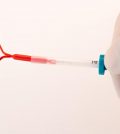- E. Coli Outbreak Linked to McDonald’s Quarter Pounders Widens to 75 Cases in 13 States; 22 Hospitalized
- Weight-Loss Surgeries Decline 25% as More Americans Turn to GLP-1 Meds
- Burger King, Other Fast Food Chains Also Pulling Onions Tied to E. Coli Outbreak
- CDC Confirms Second Human Bird Flu Case in Missouri With No Known Exposure to Farm Animals
- CDC Says Some People May Need Extra Dose of COVID Vaccine
- Wildfires Are Gaining Speed in Western U.S., Upping Threat to People
- People’s Brains Now Process Texts Almost as Quickly as Pictures
- There’s Still Confusion on How to Spot, Treat Severe Allergic Reactions
- What Works Best to Ease MS-Linked Fatigue? New Study Finds Out
- Are ‘Elimination Diets’ Much Help Against Child Eczema?
H5N1 Bird Flu Vaccine Approved


A new vaccine has been approved by the U.S. Food and Drug Administration to prevent the so-called “bird flu” virus in adults at greater-than-average risk of exposure, the FDA said.
While most strains of bird flu don’t infect people, the H5N1 virus has caused “serious illness and death in people outside of the U.S., mostly among people who have been in close contact with infected and ill poultry,” the agency said in a news release announcing the approval.
The shot, called the Influenza A (H5N1) Virus Monovalent Vaccine, has been developed “in the event that the H5N1 avian influenza virus develops the capability to spread efficiently from human to human, resulting in the rapid spread of the disease across the globe,” the FDA added.
The vaccine, produced by a Canadian subsidiary of GlaxoSmithKline, is not intended for commercial distribution, the FDA said. It’s designed to be administered in two doses given three weeks apart.
In clinical testing involving some 3,400 adults, the most common side effects included injection-site pain and swelling, muscle aches, headache and fatigue.
More information
To learn more about bird flu, visit flu.gov.
Source: HealthDay
Copyright © 2024 HealthDay. All rights reserved.








-200x224.jpg)

